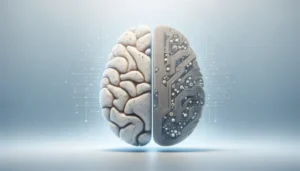AI Enhancements in Medical Diagnosis
Artificial intelligence is transforming medical diagnosis by analyzing complex healthcare data. It helps clinicians detect subtle patterns that might be missed through traditional methods.
This improved data analysis leads to more precise and earlier diagnoses, enhancing patient outcomes across a wide range of diseases. AI’s role in diagnostics is becoming essential for modern healthcare.
With AI support, medical professionals can better interpret images, lab results, and patient histories, thus ensuring thorough and timely detection of conditions.
Data Analysis for Pattern Recognition
AI algorithms excel at identifying intricate patterns within vast medical datasets. These patterns often reveal early signs of diseases like pneumonia or heart failure.
By processing diverse data types, such as imaging and lab results, AI uncovers correlations undetectable by human analysis. This leads to heightened diagnostic accuracy.
Such enhanced pattern recognition enables faster decision-making, allowing clinicians to intervene sooner and tailor treatments effectively.
Integrating AI’s pattern recognition into clinical workflows supports proactive and data-driven patient care, improving health outcomes overall.
Support for Differential Diagnosis
AI assists clinicians by generating comprehensive lists of possible diagnoses based on patient data. This helps narrow down potential conditions efficiently.
Support for differential diagnosis ensures that rare or complex diseases are considered, reducing the risk of missed or incorrect diagnoses.
This technology complements the clinician’s expertise, enhancing decision confidence and improving patient safety through more thorough evaluations.
AI-Driven Personalized Treatment
AI is revolutionizing personalized treatment by analyzing unique patient data to create customized therapy plans. This approach optimizes treatment efficacy and minimizes side effects.
By integrating patient genetics, lifestyle, and clinical information, AI enables healthcare providers to design therapies tailored to individual needs, enhancing recovery and quality of life.
AI’s capability to process complex datasets supports precision medicine, transforming generic treatment protocols into personalized care strategies.
Tailoring Therapy Plans
AI uses comprehensive patient information, including genetic profiles and medical history, to customize therapy plans specific to each individual.
This tailored approach helps avoid ineffective treatments and reduces adverse reactions, thereby improving patient outcomes and adherence to therapy.
By continuously learning from treatment outcomes, AI refines future therapy recommendations, ensuring dynamic and effective care adjustments.
Clinical Decision Support Systems
Clinical decision support systems powered by AI analyze data and clinical evidence to suggest optimal treatment options to healthcare providers.
These systems enhance practitioner decision-making by providing evidence-based recommendations, reducing errors and supporting complex case management.
AI-driven support tools facilitate informed discussions between clinicians and patients, promoting shared decision-making and personalized care plans.
Predicting Disease Progression
AI predictive models assess patterns in patient data to forecast disease trajectories, allowing early intervention and improved management strategies.
Accurate predictions of disease progression help clinicians adjust treatments proactively, potentially slowing or preventing complications.
These forecasts support long-term care planning and resource allocation, enhancing overall healthcare efficiency and patient quality of life.
Optimizing Medical Workflows with AI
AI significantly streamlines medical workflows by automating repetitive tasks, allowing healthcare professionals to focus on direct patient care. This automation reduces errors and saves valuable time.
Additionally, AI enhances patient safety and outcomes by enabling real-time monitoring, which provides continuous data analysis and timely alerts for clinicians, improving response times in critical situations.
The integration of AI into workflows leads to increased operational efficiency, better resource management, and smoother clinical processes, benefiting both patients and providers.
Automation of Routine Tasks
AI automates many routine tasks such as data entry, appointment scheduling, and billing, reducing administrative burdens for healthcare staff.
This automation minimizes human errors and frees clinicians to spend more time on patient interaction and complex decision-making, improving overall care quality.
By handling repetitive workflows, AI enables faster processing of patient information, supporting timely clinical interventions and smoother hospital operations.
Real-Time Patient Monitoring
AI facilitates continuous real-time monitoring of patients by analyzing data from wearable devices and medical sensors. This allows early detection of critical changes in patient conditions.
Alerts generated by AI systems enable healthcare teams to respond promptly, potentially preventing complications and reducing hospital readmissions.
Such monitoring supports proactive care delivery and personalized adjustments to treatment plans based on immediate patient feedback and vital signs.
Challenges and Considerations in AI Adoption
Adopting AI in healthcare presents significant challenges, particularly regarding system integration and compatibility with existing technologies. Ensuring smooth interoperability is essential.
Moreover, safeguarding patient data privacy and navigating complex regulatory landscapes are critical for responsible AI implementation in clinical settings.
Addressing these challenges is necessary to fully realize AI’s potential in enhancing healthcare while maintaining trust and compliance.
Integration and System Compatibility
Integrating AI solutions into healthcare requires compatibility with diverse medical systems and electronic health records, posing technical difficulties.
Healthcare providers must ensure that AI tools seamlessly fit within their existing workflows without disrupting clinical operations or data exchanges.
Successful integration depends on collaborative efforts between developers, clinicians, and IT specialists to facilitate reliable and efficient AI adoption.
Without proper compatibility, AI implementation risks delays, errors, or underutilization, limiting benefits for patients and providers.
Data Privacy and Regulatory Issues
Protecting sensitive patient information is paramount when employing AI technologies that process vast amounts of health data.
Compliance with data privacy laws, such as HIPAA or GDPR, demands strict security measures and transparent data handling practices.
Regulatory frameworks must evolve to address AI-specific challenges, ensuring safety, efficacy, and ethical use in medical decision-making.
Balancing Innovation and Compliance
Striking a balance between leveraging AI’s capabilities and adhering to legal standards requires ongoing evaluation and adaptation of policies.
Organizations must implement robust governance and monitoring systems to maintain patient trust while fostering innovation in healthcare AI.







